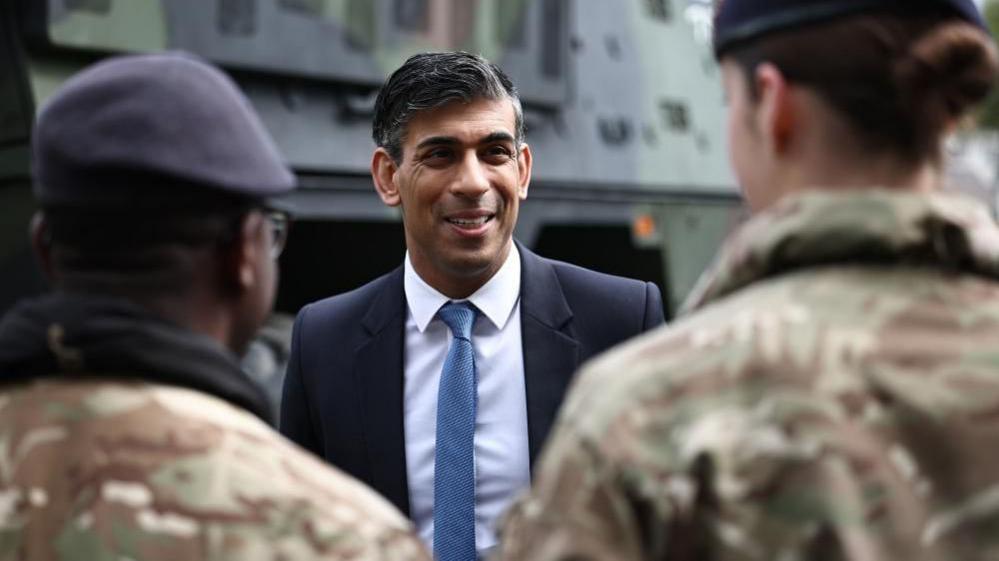Conservatives want to bring back compulsory national service

- Published
Twelve months of mandatory national service would be reintroduced by the Conservatives if they win the general election.
Eighteen-year-olds would be able to apply for one of 30,000 full-time military placements or volunteering one weekend a month carrying out a community service.
Prime Minister Rishi Sunak said he believed bringing back compulsory service across the UK would help foster the "national spirit" that emerged during the pandemic.
Labour criticised the plans, expected to cost about £2.5bn, as "desperate" and "unfunded".
The Conservatives want the first teenagers to take part in a pilot from September 2025, with details to be worked out by a Royal Commission
The armed forces placements would allow young people to learn about cyber security, logistics, procurement, or civil response operations.
Non-military volunteering would involve 25 days with organisations such as the fire service, the police and the NHS.
Mr Sunak said: “This is a great country but generations of young people have not had the opportunities or experience they deserve and there are forces trying to divide our society in this increasingly uncertain world.
"I will bring in a new model of national service to create a shared sense of purpose among our young people and a renewed sense of pride in our country."
He added the move would help young people learn "real world skills, do new things and contribute to their community and our country".
What is the Tory national service plan and how might it work?
- Published27 May 2024
Could the UK's 'pre-war generation' become a citizen army?
- Published25 January 2024
Britain must train citizen army, military chief warns
- Published24 January 2024
France brings back national service
- Published27 June 2018
The Conservatives said the move would help ensure young people who were not employed, in education or training, or at risk of getting involved with crime, would diverted away from "lives of unemployment and crime".
They were unable to say what sanctions those not taking part could face.
Instead, they argued, national service would provide "valuable work experience" and "ignite a passion for a future career in healthcare, public service, charity or the armed forces".
The party said the £2.5bn cost of national service would see £1.5bn diverted from levelling up's UK Shared Prosperity Fund from 2028. A further £1bn would come from plans to crack down on tax avoidance and evasion.
A Labour Party spokesperson said former Prime Minister David Cameron had outlined a similar idea with his "Big Society" in 2010.
Labour said: "This is another desperate £2.5 billion unfunded commitment from a Tory Party which already crashed the economy, sending mortgages rocketing, and now they’re spoiling for more.
“This is not a plan – it’s a review which could cost billions and is only needed because the Tories hollowed out the armed forces to their smallest size since Napoleon."
Liberal Democrat defence spokesperson Richard Foord MP accused the Tories of cutting troop numbers.
Mr Foord said: "If the Conservatives were serious about defence, they would reverse their damaging cuts to our world class professional armed forces, instead of decimating them, with swingeing cuts to the number of our regular service personnel."
"Our armed forces were once the envy of the world. This Conservative government has cut troop numbers and is planning more cuts to the size of the Army."
Military conscription has never applied in Northern Ireland, and so far there are no details about what would happen there.
National service was introduced in 1947 after World War Two by Clement Attlee’s Labour government.
It meant men between the ages of 17 and 21 had to serve in the armed forces for 18 months.
The mandatory national service scheme came to an end in 1960.
Earlier this year, the Chief of the General Staff, Sir Patrick Sanders, suggested the UK might need a "citizen army" to fight Putin but his concerns were dismissed by Mr Sunak's team at the time as "not helpful".
A number of European countries, including Sweden, Norway and Denmark, already have a form of conscription for their armed forces.
Conscription requires young men and women to serve for a limited time in uniform. It means that some of the population will have had some military training - and can then be assigned to reserve units should war break out.
Cuts in the British Army have seen its size fall from more than 100,000 in 2010 to around 73,000 as of January 2024.